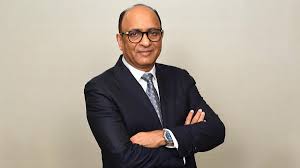IndusInd Bank CEO Sumant Kathpalia Steps Down Following Derivatives Accounting Issue
IndusInd Bank CEO Sumant Kathpalia has resigned with immediate effect, following a derivatives accounting lapse that significantly impacted the bank’s net worth. Kathpalia’s departure comes just days after the resignation of his deputy, Arun Khurana, as the private lender faces scrutiny over accounting discrepancies that have shaken investor confidence.

IndusInd Bank CEO Sumant Kathpalia has resigned with immediate effect, following a derivatives accounting lapse that significantly impacted the bank’s net worth. Kathpalia’s departure comes just days after the resignation of his deputy, Arun Khurana, as the private lender faces scrutiny over accounting discrepancies that have shaken investor confidence.
The resignation of both top executives follows an intervention by the Reserve Bank of India (RBI), which had urged the pair to step down in response to the accounting lapses, Reuters reported in March. Kathpalia’s departure marks a significant management shakeup at the country’s fifth-largest private bank, with sources indicating that further leadership changes and a broader restructuring are expected in the coming weeks.
The accounting issue at IndusInd Bank emerged earlier this year, when the lender disclosed discrepancies in its derivatives portfolio. The errors were found to be the result of years of lax controls and aggressive profit-seeking practices. The impact of the mistakes was severe, wiping out a significant portion of the bank’s profit for an entire quarter.
Kathpalia, who has been with the bank for over 12 years, accepted moral responsibility for the lapses in his resignation letter. “I undertake moral responsibility, given the various acts of commission/omission that have been brought to my notice,” Kathpalia stated, according to a stock exchange notification.
A seasoned banker with nearly three decades of experience, Kathpalia had been appointed CEO of IndusInd Bank in March 2020, shortly before the accounting issues were brought to light. He had recently received a one-year extension from the RBI, which has now been overshadowed by the accounting scandal.
IndusInd Bank has a balance sheet of approximately $63 billion, and the resignation of its top executives is expected to lead to a period of uncertainty for the bank. The company has sought approval from the RBI to establish a committee of senior executives to manage the CEO’s responsibilities until a permanent replacement is appointed.
While the leadership transition is ongoing, the RBI has reassured depositors that their funds remain secure. “Depositors have no reason to worry… There will be no run on the bank,” a source familiar with the central bank’s stance told Reuters. However, the bank has already reported a decline in the growth of term and low-cost deposits in the aftermath of the accounting scandal.
Shares of IndusInd Bank have dropped 7% since the accounting issue was disclosed, reflecting investor concerns about the management shakeup and potential long-term effects on the bank’s performance.
The Hinduja family, which promotes IndusInd Bank and holds a 15.8% stake in the lender, has proposed raising its stake to 26%, but that plan is still pending approval from the RBI. The family does not currently have a representative on the bank’s board, in line with existing regulations.
Analysts predict that finding a replacement for Kathpalia will take time, which may slow the bank’s growth and affect profitability in the short term. “Getting a best-fit leader for the bank is not done overnight, and until a strong leadership team with a solid reputation is in place, business development will slow down,” said Vinit Bolinjkar, head of equity research at Ventura Securities.
IndusInd Bank, which is listed on the Bombay Stock Exchange, did not immediately respond to requests for comment regarding the resignations or future leadership announcements.
Sources By Agencies







